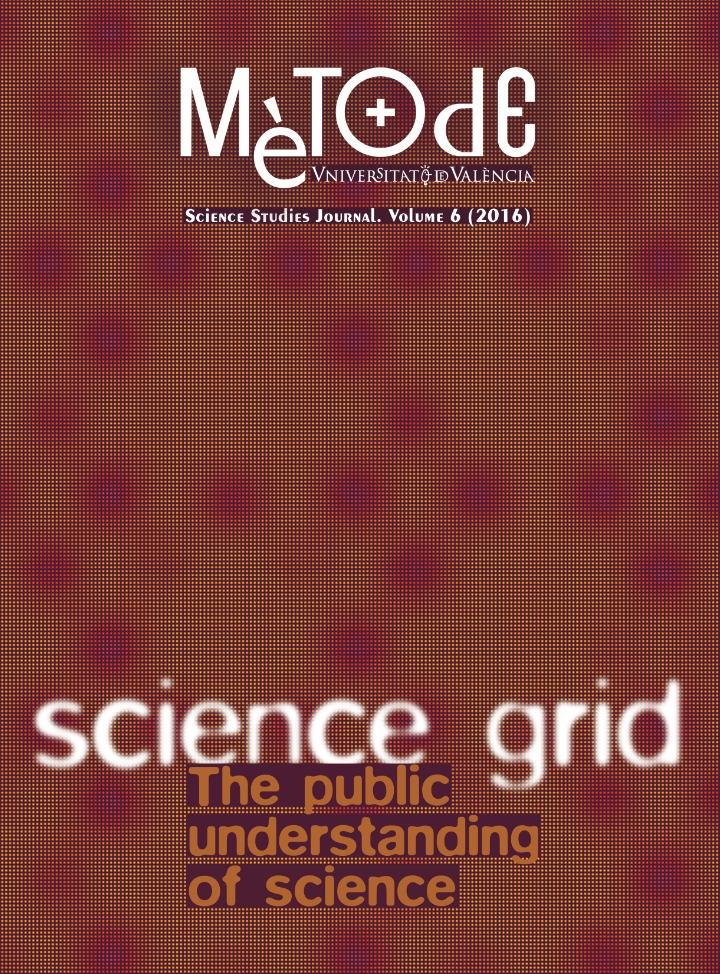Genes, genomes, and codes: Revisiting some key terms with multiple meanings
DOI:
https://doi.org/10.7203/metode.6.4083Keywords:
code, codescript, central dogma, genetic information, genes and genomes Abstract
Abstract
Is a genome the full complement of an organism’s genes or of its DNA? Is genetics the study of genes or of heredity? Is the genetic code the mechanism for translating nucleotide sequence to amino acid sequence or to phenotype? Does «genetic information» refer to the sequences coding for proteins or to all DNA sequences? Each of these questions stems from an elision between one, concrete, meaning, and another, open-ended and ambiguous. Such elision invites the illusion that the ambiguity of the open-ended term has been resolved, and by implication, that the gap between actual achievement and promise has been closed. Yet, despite the phenomenal progress molecular biology has made, we remain without an adequate account of the organization of proteins into an organism.
 Downloads
Downloads
 References
References
Ball, P. (2013). DNA: Celebrate the unknowns. Nature, 496, 419–420. doi: 10.1038/496419a
Davis, B. D. (1990). The human genome and other initiatives. Science, 249: 342–343.
Doolittle, W. F., & Sapienza, C. (1980). Selfish genes, the phenotype paradigm and genome evolution. Nature, 284, 601–603. doi: 10.1038/284601a0
Gibbs, W. W. (2003). The unseen genome: Gems among the junk. Scientific American, 289, 46–53. doi: 10.1038/scientificamerican1103-46
Keller, E. F. (2000). The century of the gene. Cambridge, MA: Harvard University Press.
Keller, E. F. (2014). From gene action to reactive genomes. The Journal of Physiology, 592(11), 2423-2429. doi: 10.1113/jphysiol.2014.290991
Mattick, J. S. (2004). RNA regulation: A new genetics? Nature Reviews Genetics, 5, 316–323. doi: 10.1038/nrg1321
Mattick, J. S. (2010). RNA as the substrate for epigenome-environment interactions: RNA guidance of epigenetic processes and the expansion of RNA editing in animals underpins development, phenotypic plasticity, learning, and cognition. Bioessay, 32, 548–552. doi: 10.1002/bies.201000028
Ohno, S. (1972). So much “junk” DNA in our genome. Brookhaven Symposium in Biology, 23, 336–370.
Orgel, L. E., & Crick, F. H. (1980). Selfish DNA: The ultimate parasite. Nature, 284(5757), 604–607. doi: 10.1038/284604a0
Oxford English Dictionary. (n.d.). Code. In F. McPherson (Ed.) Oxford English dictionary online. Retrieved from http://www.oed.com/view/Entry/35578?rskey=ppAXGm&result=1#eid
Schrödinger, E. (1944). What is life? Cambridge: Cambridge University Press.
The ENCODE Project Consortium. (2007). Identification and analysis of functional elements in 1 % of the human genome by the ENCODE pilot project. Nature, 447, 799–816. doi: 10.1038/nature05874
The International HapMap Consortium. (2003). The International HapMap Project. Nature, 426, 789-796.
The International HapMap Consortium. (2004). Integrating ethics and science in the International HapMap Project. Nature Reviews Genetics, 5, 467–475. doi: 10.1038/nrg1351
Weinberg, R. A. (1991). The human genome initiative. There are two large questions. The FASEB Journal, 5, 78.
Downloads
Published
How to Cite
-
Abstract1066
-
PDF432
Issue
Section
License
![]()
All the documents in the OJS platform are open access and property of their respective authors.
Authors publishing in the journal agree to the following terms:
- Authors keep the rights and guarantee Metode Science Studies Journal the right to be the first publication of the document, licensed under a Creative Commons Attribution-NonCommercial-NoDerivatives 4.0 International License that allows others to share the work with an acknowledgement of authorship and publication in the journal.
- Authors are allowed and encouraged to spread their work through electronic means using personal or institutional websites (institutional open archives, personal websites or professional and academic networks profiles) once the text has been published.





